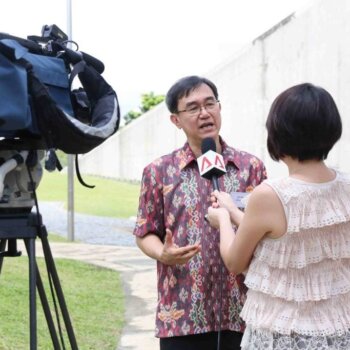One of the biggest surprises I’ve had recently was seeing the importance of social entrepreneurship in China. In a country that is often described as combining the worst of the capitalist and communist worlds, I found people who are trying to change both, and now. Currently there are few in number, but they are part of a trend that’s gaining traction with the younger generations.
The most ambitious is Isaac Mao. Known for being one of China’s first bloggers, Mao decided make his entrepreneurial and IT skills available to activists. He spends his time between Hong Kong, Shanghai and Beijing, so he can help the most people
Mao has a theory of “sharism,” that sharing creates value for givers as well as receivers. Taking inspiration from the brain’s neural relationships, he approaches social relations as the relationship between social neurons, or “seurons.”
“The flow is the important part, how information is transmitted from one seuron to another in real time,” he says.
Mao is working on a project that should launch by the end of the year: a tech platform to allow activists and people working for social good without goal of financial profit, to expand their projects, like the one run by Dadwa, a singer who helps artisans and designers from minority backgrounds promote their products.
“She’s famous as a singer,” Mao says. “But she doesn’t know the Web well.”It’s an area where Mao’s help can be valuable.
Mao’s tech skills can be beneficial in three ways:
- Creating a social graph and communication tools that allow communication between participants
- Offering a payment system that facilitates e-commerce for people who have difficulty establishing maret-presence for their own boutiques.
- Allowing artisans and small businesses to integrate into an efficient supply-chain management system.
“We combine the best software, the best social networks and the best business processes to satisfy complex needs that no existing platform can satisfy,” Mao says. “I try to connect people, not just to make money. My goal is sustainability.”
“A social business can’t succeed on its own in China,” he adds. Hence the idea for a platform. Happily, he’s not the only person who sees the need.
Yin Yang, for example, has fewer resources, but wants to create “a quality environment to allow people to participate in social innovation,” by providing a space for sharing ideas and projects.
The Beijing startup We-Impact approaches things from a different angle. The Shanghai-based company offers organizations a framework for reflection and action, teaching them that it is possible to generate revenue through sustainable development.
“Our parents’ generation started the development process. Our generation needs to create social responsibility,” says Ann Wang, We-Impact’s co-founder. She realized this in 2009, while in Copenhagen attending a climate-change conference. Up to that point, she had worked in luxury industries and concierge services for the ultra-wealthy.
When she returned from the conference, she started to work with a British associate and Simon Kubski, a Canadian who has lived in China for five years and speaks the language fluently. Their goal wasn’t to oppose industrialization, but to take a more social approach to it, trying to change people and organizations’ lifestyles, since that is where “human values and action” meet, Kubski says.
Wang and Kubski call themselves “engagement specialists” who create a sense of participation among the groups they work with, notably in convention and conference sessions. They’ve hosted everything from Shanghai Fashion Week’s closing ceremonies to music festivals. But they also help companies – from a pizza place to the local Lexus branch – reexamine their values.
“We don’t necessarily provide a solution,” Wang says. “But the framework we give helps them get there. It’s important, especially in this area, that founders and leaders come to their own conclusions, reexamining their own values and figuring out how to translate them to the product or service level.”
They did this with Sophia Pan, of P1.cn, a successful social network built around luxury brands. Working with We-Impact, the company is in the process of changing “into a platform where people can share their real lives with their real friends,” Pan says.
“We’re driven more by values than by commerce,” Pan says, adding that she hopes to provide exclusive contributions. By doing this she risks losing, and assumes she will lose, half of her network’s members. That’s the gamble, trying to do this while maintaining positive revenue: Pan hopes she will bring together the real leaders in China’s young generation, a generation she describes as “very surprising.”
Several things contribute to this movement’s emergence
First, it’s important to recognize that there is a notion of trendiness in things like this, as I learned from social activist Ye Yin. Things happen after people start talking about them.
A few people have told me about the importance of “values,” which they believe were lost during China’s development, as a way of forgetting 1989′s suppressed protests. They’re conscious of the potential for further widening of social and geographic inequalities, and that they can’t wait for the government to act on this.
Instead, they took matters into their own hands, trying to change society without doing politics – something that’s important to many young Chinese.
It’s even more interesting that these young people want to be “civic-minded,” to use a word used to describe them by Yin Yang, another social entrepreneur. Maybe they’re helping start a renaissance in active civil society?
Can we learn from this?
There are definitely lessons here for people who think that democratic nations are experiencing a crisis in traditional politics right now.
This sort of action isn’t a way of eluding a dictatorship’s restraints, but a way of helping solve problems that the political class is incapable of addressing.
This is no doubt why social entrepreneurship – the pursuit of social objectives by a company that must also keep its revenue in mind – is becoming attractive to a growing number of young people around the world.
__________________________________________
About the Author
This article was written by Francis Pisani, a blogger who shares his insights on business and various developments. see more.


































